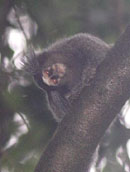Get
To Know
|
 The
White Tufted Marmoset is a New
World primate who lives
in the forests on the Atlantic coast of southeast Brazil. Of all
the marmosets, they have the southernmost range. They have a grey-black
skin, a touched tail and remarkable white ear-tufts which flop over
more distinctly than the Common Marmoset's. They live in the coastal
forests up to a sea-level of 500 m. They are diurnal and arboreal,
living almost all of their life in the trees. They live together
in small groups of two to eight animals. Their size ranges from
only 14 to 18 centimeters and weigh around 400 grams. Their diet
consists of tree sap, fruit, insects, eggs of birds, flowers and
spiders. Common Marmosets have long limbs and tail which they use
for climbing and have specially designed teeth for extracting gum
from trees. Distinguishing characteristics of common marmosets include
white ear tufts, and a white blaze on the forehead. Little is known
about their reproductive patterns. Gestation is approximately 170
days and births are typically of twin offspring. The
White Tufted Marmoset is a New
World primate who lives
in the forests on the Atlantic coast of southeast Brazil. Of all
the marmosets, they have the southernmost range. They have a grey-black
skin, a touched tail and remarkable white ear-tufts which flop over
more distinctly than the Common Marmoset's. They live in the coastal
forests up to a sea-level of 500 m. They are diurnal and arboreal,
living almost all of their life in the trees. They live together
in small groups of two to eight animals. Their size ranges from
only 14 to 18 centimeters and weigh around 400 grams. Their diet
consists of tree sap, fruit, insects, eggs of birds, flowers and
spiders. Common Marmosets have long limbs and tail which they use
for climbing and have specially designed teeth for extracting gum
from trees. Distinguishing characteristics of common marmosets include
white ear tufts, and a white blaze on the forehead. Little is known
about their reproductive patterns. Gestation is approximately 170
days and births are typically of twin offspring.
|
|
|
|
Thoreau called them
savages from
the English and
French. They
say he didn't
really mean
anything by it. That
that was just a
common term used to identify
the indigenous people
of this continent,
implemented by the
Europeans who had
invaded it.
But I wonder if anyone back then
ever called a spade a spade.
Did anyone ever challenge
this and other white supremacy
thinking written in his
masterpiece, Walden?
Did anyone ever get up in
Henry David's hairy mug
and lecture him on the ignorance
of such a terminology expressed
toward an entire race of people?
Did Ralph Waldo Emerson
love him enough as a friend
to ever point out
this obvious
blind spot
in Thoreau's pristine contemplation
of justice
and social disobedience?
Doug Draime lives in the foothills of Cascade mountain
range and he has been a presence in the 'underground' literary movement
since the late 1960's. His most recent book is More Than The Alley,
a full length collection from Interior Noise Press.
|
 The
White-Tufted Marmoset - Issue Fifteen
The
White-Tufted Marmoset - Issue Fifteen